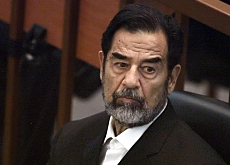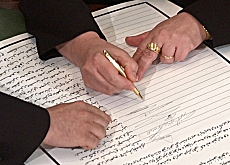Swiss speak out against Saddam death sentence

Switzerland has criticised the death penalty against former Iraqi leader Saddam Hussein who was sentenced to death by hanging by a court in Baghdad on Sunday.
International reaction is mixed with the United States and its allies welcoming the verdict, while the European Union presidency and human rights groups came out against it.
“Former Iraqi President Saddam Hussein deserves a harsh punishment for his serious crimes. The maximum sentence under Iraqi law is the death penalty,” a statement by the Swiss foreign ministry said.
But it said the death penalty, which is outlawed in the Swiss constitution, was not an acceptable form of punishment. Switzerland is active in calling for the abolition of the death penalty worldwide.
The government said it recognised the difficult task faced by the judge and the lawyers of the defendants during the one-year trial.
Foreign ministry spokesman Jean-Philippe Jeannerat added that he hoped the court proceedings against the members of the former Iraqi rulers would help the country leave its past behind.
Switzerland also expressed concern about the security situation in Iraq.
Saddam was convicted over the killing of 148 people in the mainly Shia town of Dujail following an assassination attempt on him in 1982.
His half-brother, Barzan al-Tikriti, and former judge Awad al-Bander were also sentenced to death.
Former Vice-President Taha Yassin Ramadan was sentenced to life imprisonment and three others received long prison terms. Another co-defendant was acquitted.
Saddam Hussein and his co-defendants will be given the right to appeal, but observers say that is expected to take only a few weeks and is likely to end in failure for the defendants.
“Good day”
The United States welcomed Sunday’s verdict. “It’s a good day for the Iraqi people,” a White House spokesman said.
In line with Washington Britain hailed the fact Saddam Hussein had been held to account for his crimes by the Iraqi Higher Tribunal.
The EU urged Iraq not to carry out the death sentence passed on Saddam after his conviction for crimes against humanity.
“The EU opposes capital punishment in all cases and under all circumstances, and it should not be carried out in this case either,” said Finland, current holder of the rotating EU presidency.
Concern
The United Nations High Commissioner for Human Rights, Louise Arbour, said Iraq should not carry out the execution and that it should guarantee fair appeals.
“A credible appeals process is an essential part of fair-trial guarantees and whatever the outcome of an appeal, I hope the government will observe a moratorium on executions,” the Geneva-based organisation said in a statement.
Amnesty International and other human rights groups said the trial of Saddam Hussein was flawed.
“The court was not impartial. There were not adequate steps taken to protect the security of defence lawyers and witnesses,” said Malcolm Smart, head of the Middle East and North Africa Programme for Amnesty International.
Iraqi Prime Minister Nouri Maliki welcomed the conviction in a televised address, saying the sentence was “not a sentence on one man, but a sentence against the dark period of [Saddam Hussein’s] rule”.
Shortly after the verdict there were jubilant scenes in the Shia district of Sadr City and in the holy city of Najaf.
The Iraqi authorities had imposed a 12-hour curfew in an effort to prevent further violence.
swissinfo with agencies
Saddam Hussein was convicted of crimes against humanity committed in 1982 when troops killed 148 Shi’ite Muslims in a farming village.
He and his co-defendants have the right to appeal against the sentence by a court in Baghdad.
The former Iraqi leader is facing further trials, including genocide of 180,000 Kurds in the 1980s.
Saddam Hussein took power in Iraq in 1979.
The toppled leader was captured by US forces in 2003.
His trial for crimes against humanity opened on October 19, 2005. It adjourned on December 22, 2005 and reopened in 2006.
The verdict by the Iraqi Higher Tribunal was handed down on November 5, 2006.

In compliance with the JTI standards
More: SWI swissinfo.ch certified by the Journalism Trust Initiative











You can find an overview of ongoing debates with our journalists here . Please join us!
If you want to start a conversation about a topic raised in this article or want to report factual errors, email us at english@swissinfo.ch.